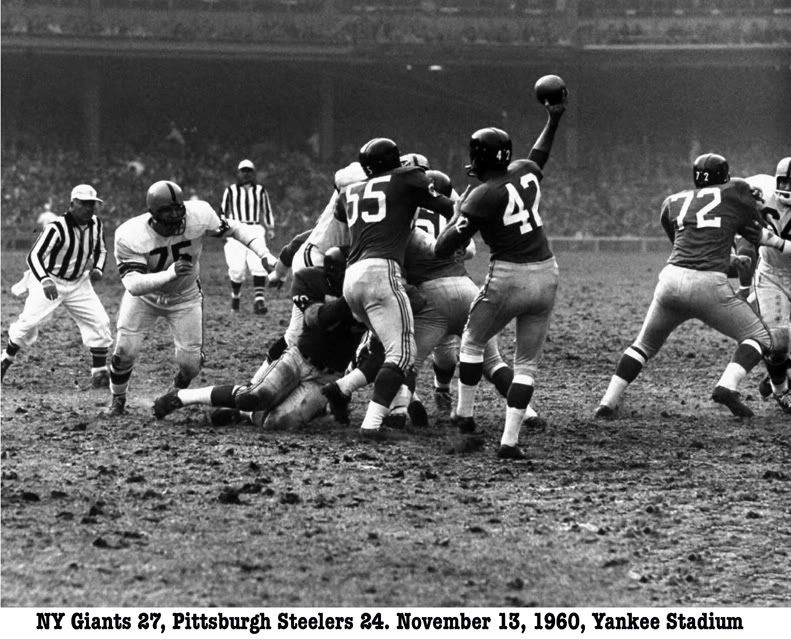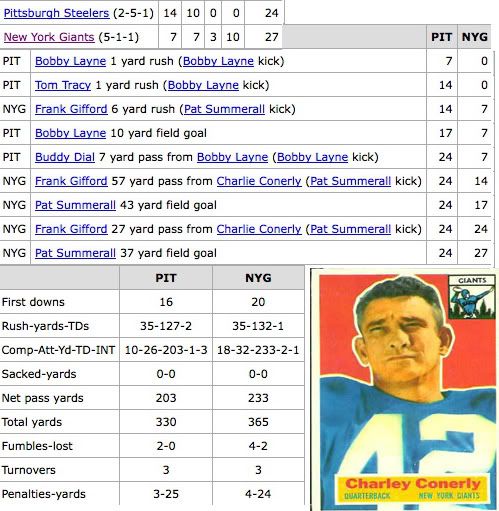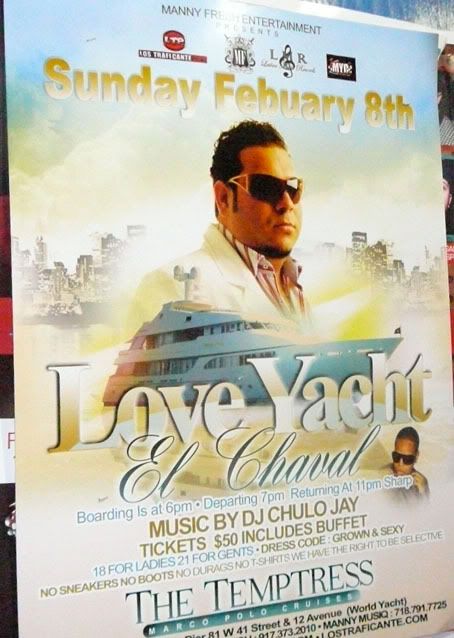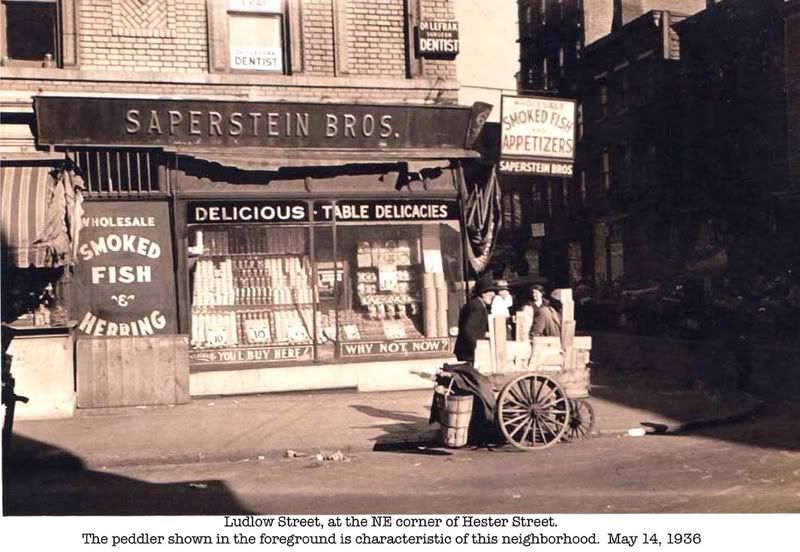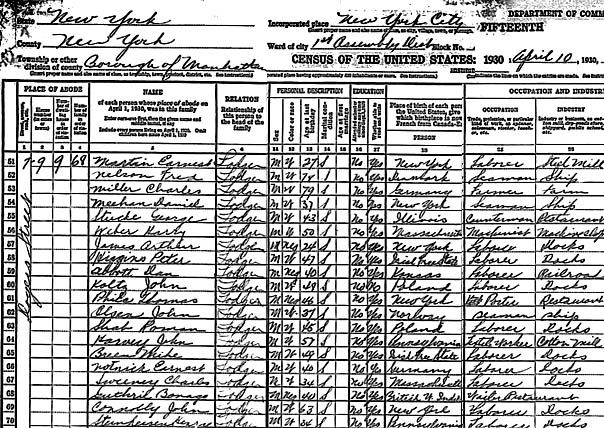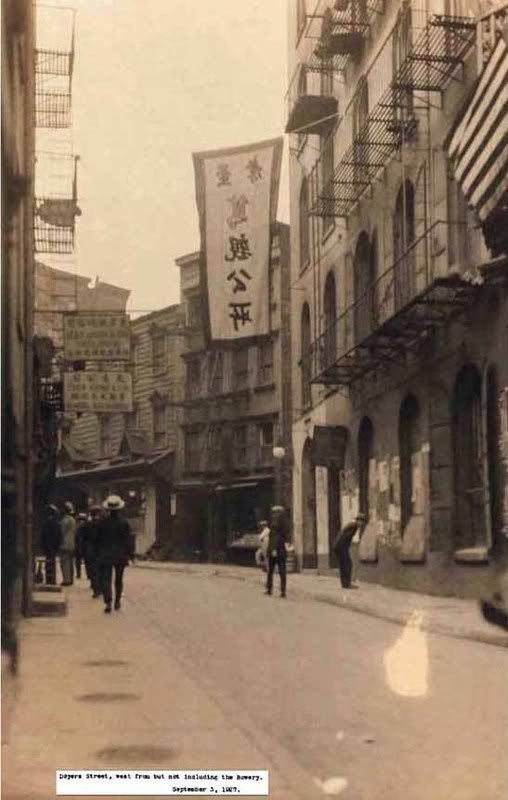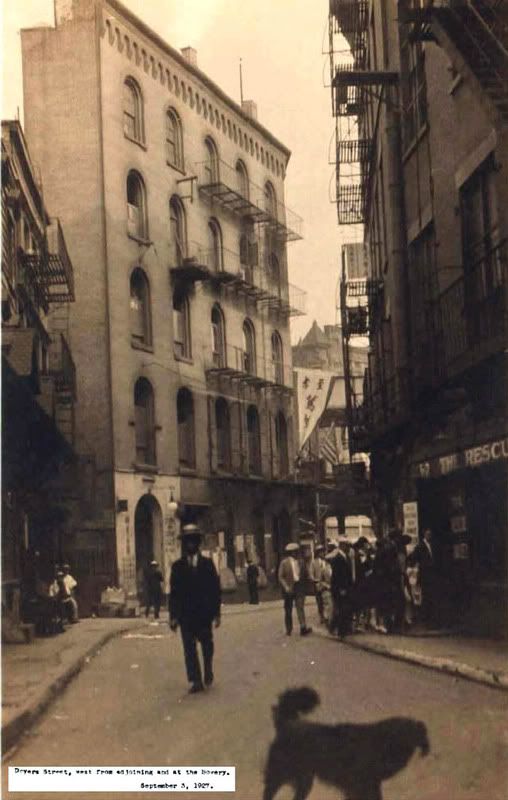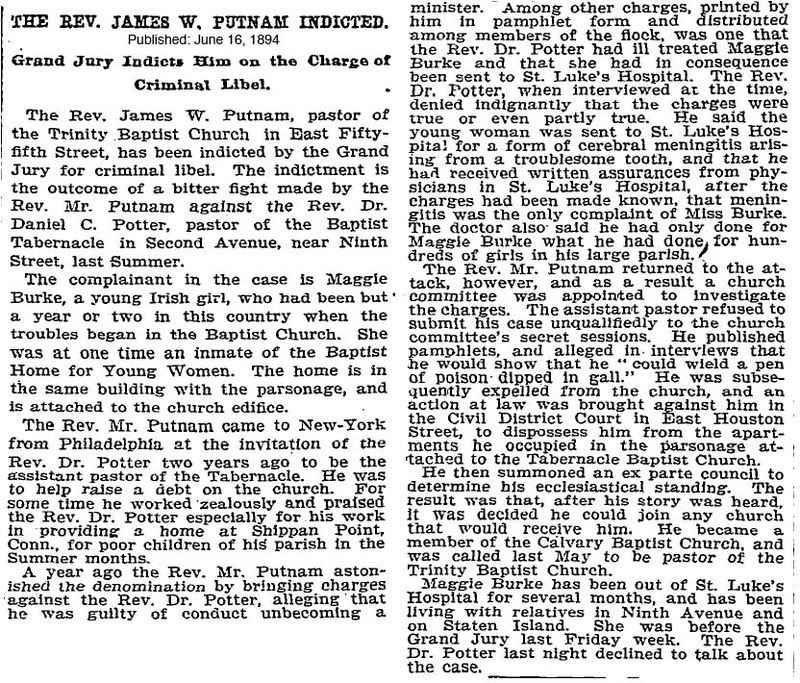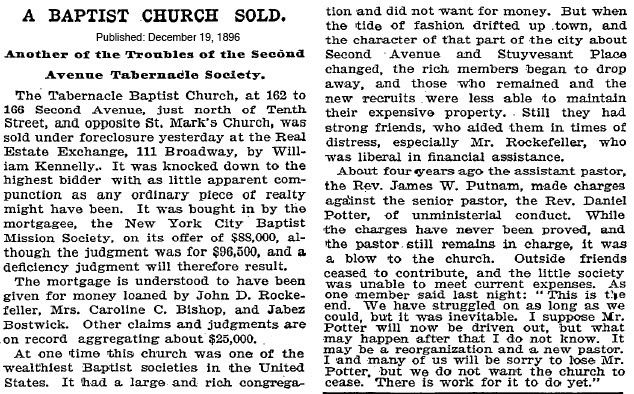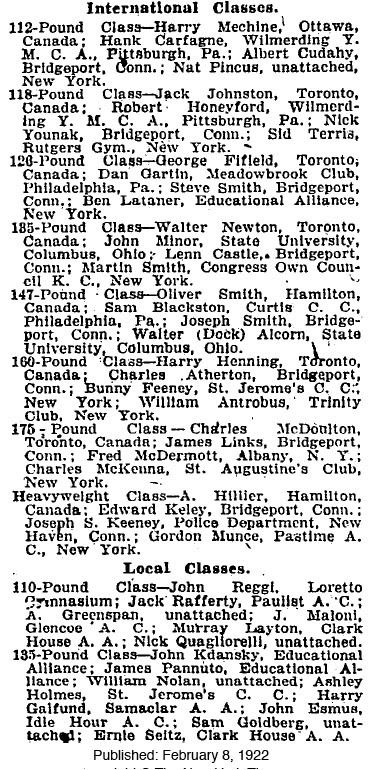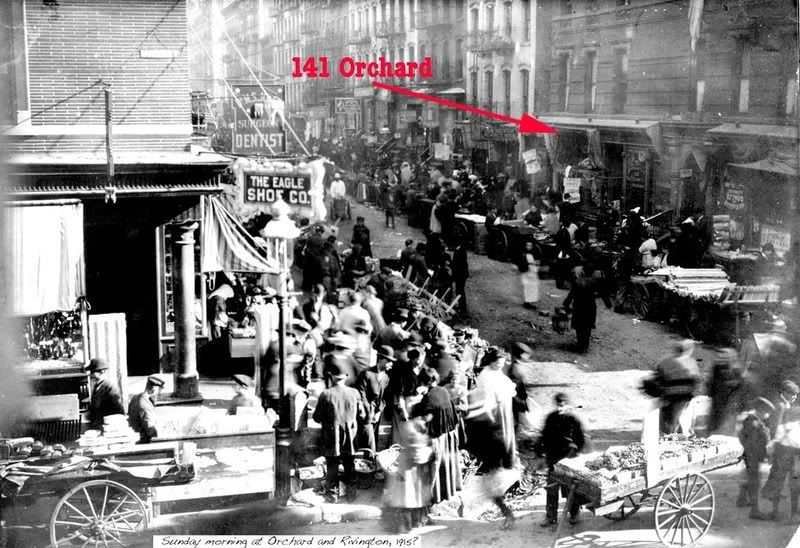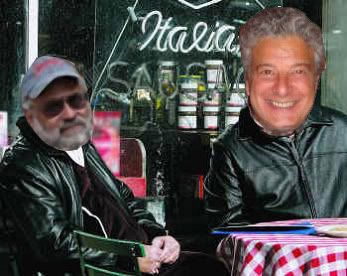Saturday, January 31, 2009
Football's Greatest Championship Game: Colts Vs Giants, 1958, Overtime
I combined the gallery of images from the pro football hall of fame with the audio I found on youtube
Football's Greatest Championship Game: Colts Vs Giants, 1958
from the pro football hall of fame
Professional football was on the rise in the 1950s and reached a crescendo during the latter part of the decade. Much of the popularity can be traced to a single game the 1958 NFL Championship Game between the Baltimore Colts and New York Giants.
The game played at Yankee Stadium in New York attracted a national television audience and became known in football lore as "The Greatest Game Ever Played" More importantly, the game captured the collective attention of the nation and as a result, pro football exploded across the country in the following years. By the mid-1960s, professional football became the nation's favorite sport to watch and has remained on top ever since.
The drama was high on December 28, 1958 as the NFL's title game moved into its final minutes of regulation. While an enamored crowd watched, the television audience lost contact when someone inadvertently nudged a cable and knocked NBC off the air for several minutes.
Hall of Famer Gino Marchetti watched from the sideline as he nursed a broken leg suffered earlier in the game. Historians note that the game actually contained its fair share of sloppiness six lost fumbles, missed field goals, interceptions, and conservative play-calling - which would detract from its moniker claiming to be the greatest game ever.
But, there's no denying that the excitement of the back-and-forth battle reached epic proportions as quarterback Johnny Unitas led the Colts' offense onto the field late in the game. With the clock ticking, the Colts began from their own 14-yard line. After two incomplete passes, Unitas connected with halfback Lenny Moore on an 11-yard play to start moving the offense up the field.
Steve_Myhra_kicks_game_tying_FG
Steve Myrhra kicked a 20-yard field goal with seven seconds to play in regulation to force the first overtime in NFL playoff history.
Johnny U. missed on a long pass to L.G. "Long Gone Dupre," before turning to his favorite target. On second-and-ten, he found Raymond Berry for a 25-yard gain to midfield. Then, Unitas looked down the left sideline and connected with Berry for another 15 yards. One more Unitas-to-Berry hook-up, which was good for 22 yards, put the Colts at the Giants' 13-yard line. With seven seconds to play in regulation, kicker Steve Myhra trotted onto the field and booted the 20-yard field goal to send the game into overtime. It marked the first time in league history that a championship game would be decided in sudden death.
The Giants won the coin toss but were forced to punt after they went three-and-out. Seizing the opportunity, Baltimore's offense methodically controlled the ball and moved 80 yards on 13 plays. History was made when fullback Alan Ameche punched through the line on a one-yard, game-winning touchdown after 8 minutes and 15 seconds of overtime to give the Colts a 23-17 win and the NFL title!
First Quarter
NYG Summerall 36 yd. FG
Second Quarter
BAL Ameche 2 yd. run (Myhra kick)
BAL Berry 15 yd. pass from Unitas (Myhra kick)
Third Quarter
NYG Triplett 1 yd. run (Summerall kick)
Fourth Quarter
NYG Gifford 15 yd. pass from Conerly (Summerall kick)
BAL Myhra 20 yd. FG
Overtime
BAL Ameche 1 yd. run (no extra point attempted)
Statistics
PASSING NYG - Conerly, 10 of 14 for 187, 1 TD; Heinrich, 2 of 4 for 13. BAL - Unitas, 26 of 40 for 361, 1 TD, 1 INT.
RECEIVING NYG - Gifford, 3 for 14, 1 TD; Rote, 2 for 76; Schnelker, 2 for 63; Webster, 2 for 17; Triplett, 2 for 15; McAfee, 1 for 15. BAL - Berry, 12 for 178, 1 TD; Moore, 5 for 99; Mutscheller, 4 for 63; Ameche, 3 for 14; Dupre, 2 for 7.
Click here to see the play-by-play from the game (PDF 1.11 MB)>>> RUSHING NYG - Gifford, 12 for 60; Webster, 9 for 24; Triplett, 5 for 12, 1 TD; Conerly, 2 for 5; King, 3 for -13. BAL - Ameche, 14 for 59, 2 TDs; Dupre, 11 for 30; Unitas, 4 for 26; Moore, 9 for 24.
Friday, January 30, 2009
Views Of The Bridge: Then And Now
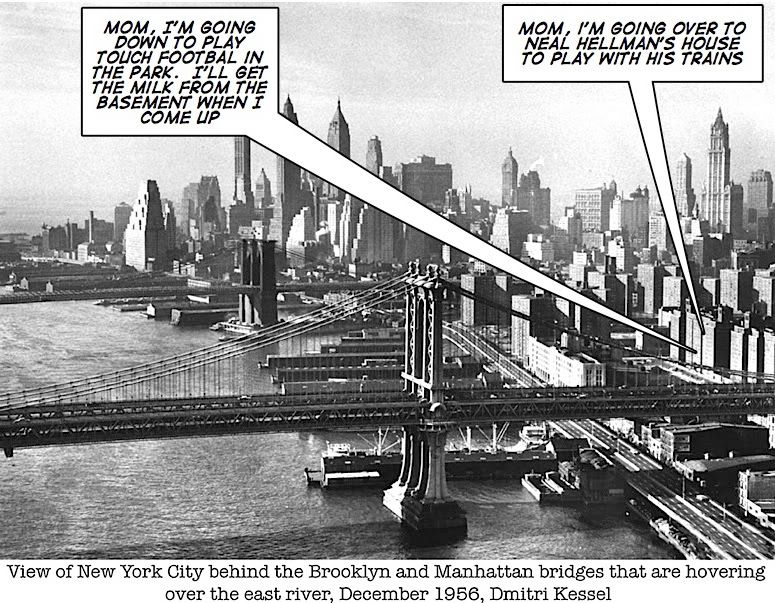
Above from google images hosted by life with added cartoon bubbles. Below from an incredible photographer/artist called Skyshaper that I found on Flickr. Looking at his archives there's a strong possibility that he/she lives near Knickerbocker Village

Red Button's Final Appearance
I blogged about Red before on pseudo-intellectualism This is one of those posts. Here's one with the Strange Things audio coupled with images of Red. Here's another with some more biographical data along with a 1920 census report and a strange event in my life
from the youtube source
"A year ago, that wonderful comedian, Red Buttons left us at the age of 87. (He was HOT stuff in the 1950s) This video was his last national TV performance, and he was the best thing on the whole program, as you will see."
Biography: The American stand-up comedian and actor was born Aaron Chwatt in New York City on Feb. 5, 1919. He entered show business as a child street singer, moving to comedy on the Borscht Belt and in a variety of Broadway roles bookending World War II. He enjoyed a big splash as the host of his own comedy-variety series in early television, but the success was fleeting. In 1955, after three seasons, two in severe ratings decline, The Red Buttons Show was canceled and he returned to acting roles.
Big Break: While the TV gig was a major accomplishment, cementing his place as one of the top funnymen of the day, it was a dramatic role in Marlon Brando's 1957 tale of prejudice, Sayonara, that changed the course of his career. Buttons was honored with the Academy Award for Best Actor in a Supporting Role. During the next five decades, he appeared occasionally on TV and in films in comic personas, but usually as a guest star or sidekick character. Red Buttons, the notable actor, became his fallback job.
But, Seriously: The movie star appeared in several high profile dramatic parts, including The Longest Day (1962), Your Cheatin' Heart (1964), Stagecoach (1966), and The Poseidon Adventure (1972). His best role, perhaps, was in They Shoot Horses, Don't They? (1969), depicting the grueling dance marathons of the Great Depression. Later, working more and more in episodic TV, he continued to spout stand-up comedy in Las Vegas and at insult roasts and benefits, stopping shows with his "Never Got a Dinner" routines.
Red Buttons Memories:
* John Wayne said of his co-star during the shooting of the lighthearted action-adventure, Hatari!: "Red is the only guy alive who could steal a movie from a monkey."
* The performer's stage alias was secured from two elements: his bright red hair and, while working as a singing bellboy, his uniform; it was adorned with four dozen buttons. Bandleader Charles "Dinty" Moore took notice and coined the 16-year-old's nickname, "Red Buttons."
* Wikipedia reports, "In 1941, José Ferrer chose Buttons to appear in a Broadway show, The Admiral Had a Wife. The show was a farce set in Pearl Harbor and was due to open on December 8, 1941. It never did as it was deemed inappropriate after the Japanese attack. In later years, Buttons would joke that the Japanese only attacked Pearl Harbor to keep him off of Broadway."
* "Strange things are happening" became a national catchphrase evolving from the run of The Red Buttons Show. Buttons wrote a popular tune with the lyrics, "Ho Ho! He He! Ha Ha! Strange things are happening!" It remained his signature theme. For half a century, he would hop on one foot, clap hands, and palm his ear whenever the music played, a childlike, trademark bit recalled by fans of his TV program.
* Mike Clark writes in USA Today: "It was 1952's The Red Buttons Show that made him an overnight success. It also made him a king-sized pain, an observation he didn't deny later. Billy Crystal's abrasive character in 1992's Mr. Saturday Night was widely thought to have been patterned on Buttons...."
Red Buttons Comic Timeline:
* 1935 - Comedy teamed with Robert Alda (father of Alan Alda) in the Catskills [Stage]
* 1939 - Minsky's Burlesque [Stage]
* 1942 - Wine, Women and Song - The last Burlesque show in New York, raided by police while Buttons was onstage.
* 1942 - Vickie [Broadway Stage]
* 1952-55 - The Red Buttons Show [TV, Best Comedian Emmy Award]
* 1958 - Imitation General [Film]
* 1962 - Hatari! [Film]
* 1963 - A Ticklish Affair [Film]
* 1966 - The Double Life of Henry Phyfe [TV sitcom]
* 1977 - Pete's Dragon [Film]
* 1978 - Movie, Movie [Film]
* 1988 - 18 Again [Film]
* 2004 - #71: Comedy Central's 100 Greatest Stand-Ups of All Time
Red Buttons Quotes and Jokes:
* "Never raise your hand to your kids. It leaves your groin unprotected."
* "The last time I heard booing like that was when I was doing my act."
* "If you want to recapture your youth, just cut off his allowance."
* "He's a real loser. He moved into a new neighborhood and got run over by the Welcome Wagon."
* "There is only one goal. That's to keep working and keep flossing."
* "Elizabeth Taylor has a big heart. She recently built a halfway house for girls who don't want to go all the way."
* "I'll tell you the truth, I wanted to leave me for Sid Caesar."
* "Ninety isn't old. You're old when your doctor doesn't X-ray you any more. He just holds you up to the light!"
* "Some of the most famous people in history never got a dinner!"
Died:
July 13, 2006, at home in Los Angeles, from vascular disease. Red Buttons was 87.
Sources: IMDb, NATREN, Wikipedia, Quote World, Brainy Quote, Think Exist, World of Quotes, IBDB, Answers.com, TCM, Mike Durrett.
Strange Thing's Are Happening
Wouldn't you know it, next Friday would have been Red Buttons 90th birthday!
Ho Ho
Ho Ho
Hee Hee
Hee Hee
Hah Hah
Hah Hah
Strange Things Are Happening
Strange Things Are Happening
I once had a teacher who flunked me in history
She asked, "Who shot Lincoln?"
I answered, "Don't blame me."
Ho Ho
Ho Ho
Hee Hee
Hee Hee
Hah Hah
Hah Hah
Strange Things Are Happening
Strange Things Are Happening
I gave golden earrings to someone who turned sweet sixteen
Now, I'm so embarrassed her ears are turning green
Ho Ho
Ho Ho
Hee Hee
Hee Hee
Hah Hah
Hah Hah
Strange Things Are Happening
Strange Things
I went to the movies and witnessed the strangest scene.
One kid brought a tv and tried to dial the screen
Ho Ho
Ho Ho
Hey Hey
Hey Hey
Hee Hee
Hee Hee
Strange Things
Strange Things
"Since girls wear those blue jeans, my troubles just never cease
What looks like my nephew, turns out to be my niece."
Ho Ho
Ho Ho
Hee Hee
Hee Hee
Hah Hah
Hah Hah
Strange Things Are Happening
Strange Things
Strange Ting's Are Happening: Chinatown, 1958
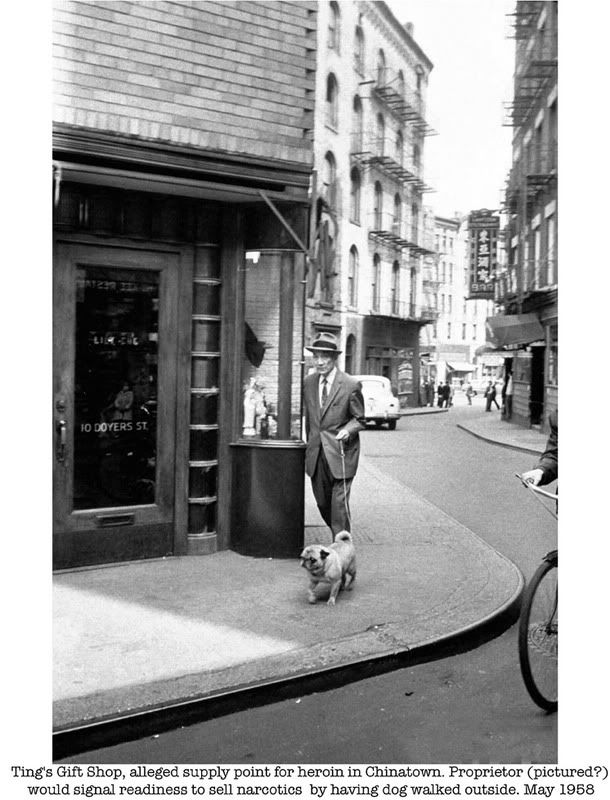
Above from google images hosted by lifeThe caption is not correct, since that is not Ting's. Ting's is further up Doyer's, on the corner with Pell. Below, a current picture of Ting's
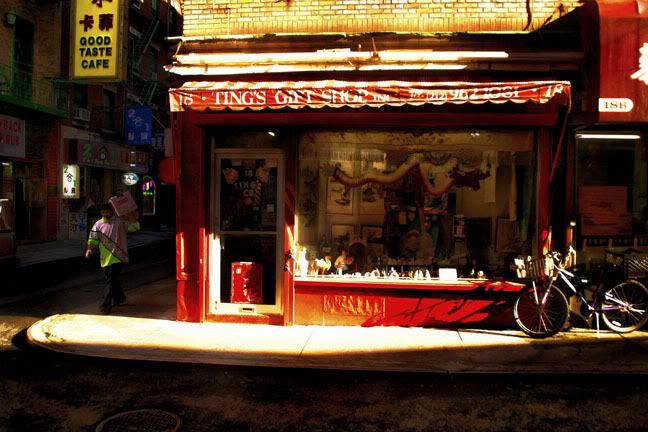
About Ting's from vanishingnewyork
Aside from the many bustling barber shops and hair salons, this nerve center contains Ting's Gift Shop, here since 1957, the year New York's last opium den was shut down. Opium still survived in private parlors and Ting's was raided in 1958, yielding 10 pounds of heroin. Today, Ting's offers a milder fare of paper dragons, finger cuffs, wooden snakes, and bamboo cricket cages.
At Last: Then And Now
Many think the ultimate or original version of At Last is by Etta James. It was written, however, for the 1941 film Orchestra Wives, featuring the Glenn Miller band, by Harry Warren and Mack Gordon. Warren was one of our most prolific and underrated songwriters. He was born Salvatore Antonio Guaragna in Brooklyn, New York in 1893. Sol Bellel would often sing this at weddings and bar mitzvahs. Is Obama smooth or what?
At last, my love has come along
My lonely days are over
And life is like a song
Oh, yeah, at last
The skies above are blue
My heart was wrapped up in clovers
The night I looked at you
I found a dream that I could speak to
A dream that I can call my own
I found a thrill to rest my cheek to
A thrill that I have never known
Oh, yeah when you smile, you smile
Oh, and then the spell was cast
And here we are in heaven
For you are mine
At last
Saperstein's: Up From Orchard Street
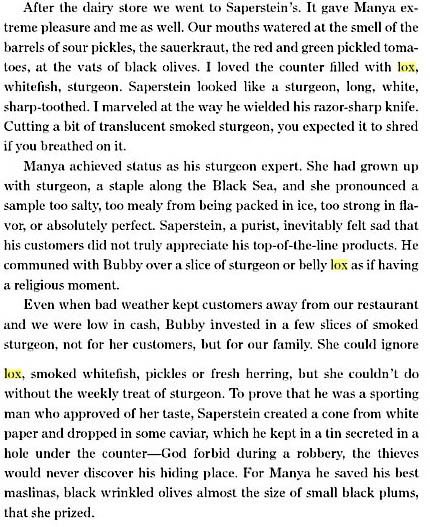
Up From Orchard Street by Eleanor Widmer
a review:
Orchard Street becomes an iconic address for generations of immigrant Jewish families pursuing the dream of freedom and prosperity in America in the 1930s. The Roth family's three generations embody the hopes, dreams, and frailties of thousands of families like them. Manya, the widowed matriarch, is the linchpin that holds the generations close while operating a restaurant from their tenement apartment. Elka, granddaughter and narrator, passionately relates the family's climb out of poverty in this posthumous autobiographical novel. Elka is a loving and acute observer, noting her adored father Jack's weakness for horseracing and other women and anxiety over his wife Lil's fragile health. Her mother is like a butterfly--destined to a short life but with a startlingly beautiful exterior. Sharing their world is a cast of other unforgettable family members and neighborhood characters that makes Orchard Street a vibrant tableau of New York's Lower East Side. A fictional tribute to the importance of home and hearth. Laurie Sundborg
Thursday, January 29, 2009
Doyers Street Census: 1930
Another View Of Doyers Street
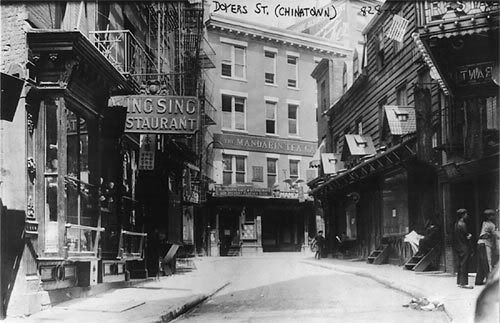
Taken about 1920, the opera house is on the left past the Wing Sing Restaurant
From the Vanishing New York blog
The street was named for Hendrick Doyer, a Dutchman who ran a distillery in the early 1800s where the post office is today. Doyer's became Doyers, thanks to "a careless painter of street signs" who "omitted the apostrophe," according to Herbert Asbury in an excellent 1926 essay about Doyers' distant history.
Known as the Bloody Angle, Doyers was the site of many battles between the Chinese tong gangs in the late 1800s and early 20th century. They killed each other with hatchets while "Disciples of the Pear Garden" sang onstage at the Chinese opera house. Doyers was also a good place to be shanghaied by a crimp or kidnapped into sexual slavery. There were opium dens and fan tan parlors. There were trapdoors, secrets openings, underground tunnels, and the infamous Arcade, a passageway that ran in an L-shape from Doyers to Mott.
Today Doyers is peaceful, but it's no empty alley like Freeman's was. A steady flow of Chinese pedestrians move through it, going to the barber shop, the post office, or just taking a shortcut. There's a sense of comfort and familiarity here. It is a vibrant community. In another great essay worth reading, Bruce Edward Hall calls Doyers "the nerve center through which throbs all the essential life of New York City’s Chinatown."
All The Single KV Ladies
Just as Justin Timberlake and Obama are secure enough in their masculinity that they can have some fun with this song, so too are KV men. Maybe they're practicing for the talent show portion of their next reunion. BTW, don't anyone tell the KV Godfather about this. You know how old-fashioned he can be.
All the single ladies (7x)
Now put your hands up
Up in the club, just …
I’m doing my own little thing
Decided to dip but now you wanna trip
Cuz another brother noticed me
I’m up on him, he up on me
Don’t pay him any attention
cried my tears, three good years
Ya can’t be mad at me
[Chorus]
Cuz if you liked it then you should have put a ring on it
If you liked it then you should have put a ring on it
Don’t be mad once you see that he won it
If you liked it then you should have put a ring on it
(Chorus)
I got gloss on my lips, a man on my hips
Hold me tighter than my Dereon jeans
acting up, breaking my …
I could care less what you think
I need no permission, did I mention
Don’t pay him any attention
Cuz you had your turn
But now you gonna learn
What it really feels to miss me
(Chorus)
Don’t treat me like things of this world
I’m not that kind of girl
Your love is what I prefer, what I deserve
Is a man that makes me and takes me
And delivers me to a destiny, to infinity and beyond
Pull me into your arms
Say I’m not the one you own
If you don’t, you’ll be alone
And like a ghost I’ll be gone
All the single ladies (7x)
Now put your hands up
(Chorus)
1908: The Chinese Opera House On Doyers Street
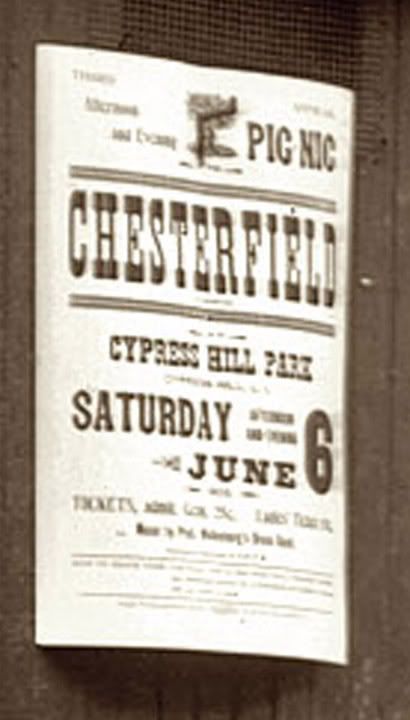
Below another gem from shorpy Above I zoomed in to read the advertisement for the picnic. Only four years earlier about 1000 people died on a similar excursion on the General Slocum
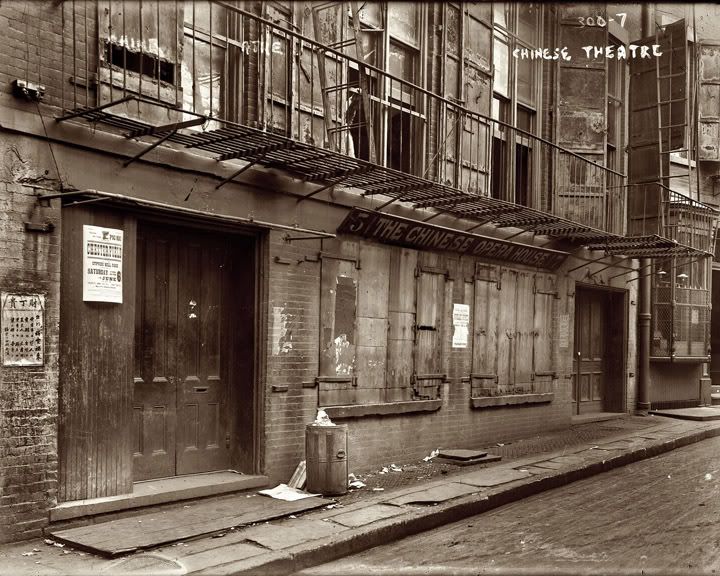
Some comments on the shorpy post about the Doyers Street photo:
5-7 Doyers, the former Opera House, is now CC Fashion.
[Fascinating. A hundred years later the bottom section of that cast-iron drainpipe is still there. - Dave]
Doyers Street in Chinatown, New York is called The Bloody Angle for its violent history. Doyers is a street with a sharp corner (hence the name) and departs from Bowery just below Canal Street. The street witnessed a remarkable number of shootings among the Tong Gangs of Chinatown between 1870 and 1930. The street was ideal for street battles not just because of its angle but also because of the tunnels that connected the buildings.
1894: Hanky Panky At The Baptist Church
The View From The Consolidated Gas Company, 1913: Part 2
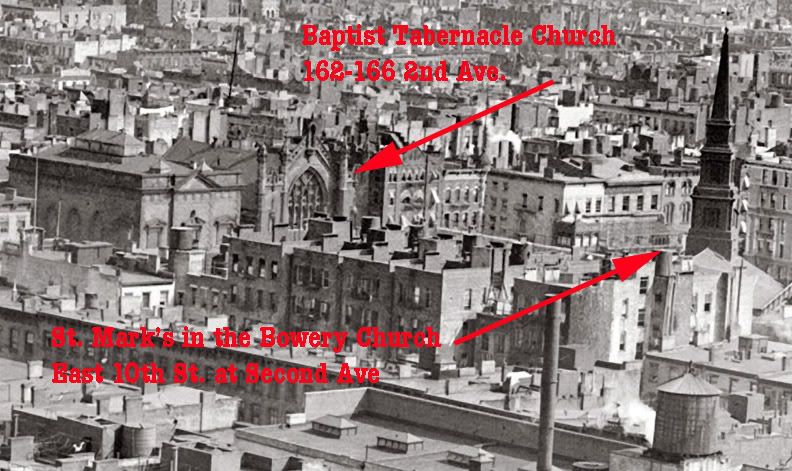
Two more close up views that shorpy's high resolution picture allows us. Above the St. Marks Church on 10th Street and the massive Baptist Tabernacle across the street. I believe one of those ubiquitous urban outfitters is there now. It took me a while to figure out what that Tabernacle was. It must be long gone. Below are close up views of Holy Redeemer Church and PS 63, both on East 3rd Street. In the distance, one of the tallest buildings on the LES at that time, the Hoe Factory on Grand and Sheriff Streets.
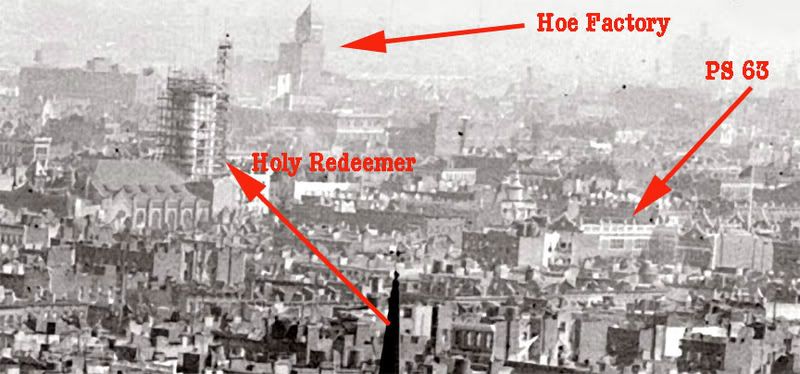
The View From The Consolidated Gas Building, 1913:
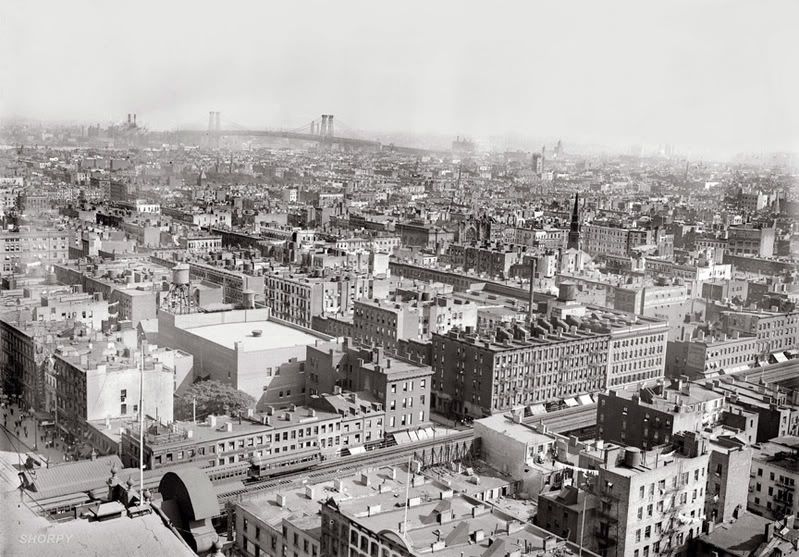 During my September-January KV hiatus I was working on a couple of other projects. One of them was, I admit, a somewhat sick obsession with dissing Caroline Kennedy and the other was an on-site Knickerbocker Village Museum. It would contain posterized versions of many of the visuals and primary documents seen on these pages. In order to do that requires the conversion of digital files into a higher resolution format. I discovered that there are PhotoShop plug-ins that allow for this like Genuine Fractals, but it also helps if you have a high resolution image to begin with. One site that has them, historically rich and public domain as well, is shorpy The image above, but not in hi-def, is an example. It's a "Summer 1913 Bird's eye view of N.Y.C. from the roof of Consolidated Gas Building." The building, later just the plain Con Edison building, is on 15th Street and Irving Place. The blog entry is not only sweet because of the digital enhancement that shorpy does, but also because of the commentary. I added some of my own historical sweet spots, below, as well
During my September-January KV hiatus I was working on a couple of other projects. One of them was, I admit, a somewhat sick obsession with dissing Caroline Kennedy and the other was an on-site Knickerbocker Village Museum. It would contain posterized versions of many of the visuals and primary documents seen on these pages. In order to do that requires the conversion of digital files into a higher resolution format. I discovered that there are PhotoShop plug-ins that allow for this like Genuine Fractals, but it also helps if you have a high resolution image to begin with. One site that has them, historically rich and public domain as well, is shorpy The image above, but not in hi-def, is an example. It's a "Summer 1913 Bird's eye view of N.Y.C. from the roof of Consolidated Gas Building." The building, later just the plain Con Edison building, is on 15th Street and Irving Place. The blog entry is not only sweet because of the digital enhancement that shorpy does, but also because of the commentary. I added some of my own historical sweet spots, below, as well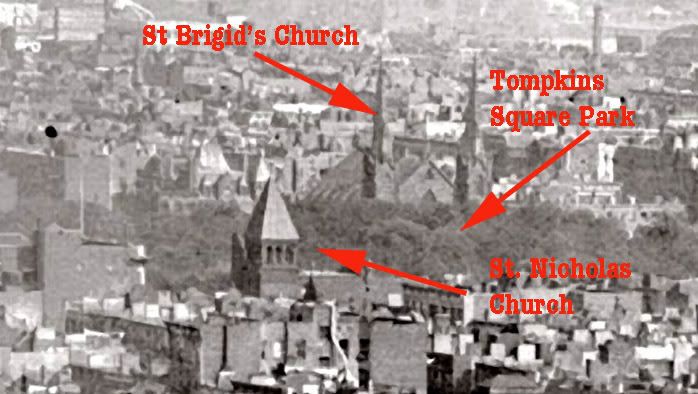
Wednesday, January 28, 2009
Al "Bummy" Davis: 390 Vermont Ave, Brooklyn
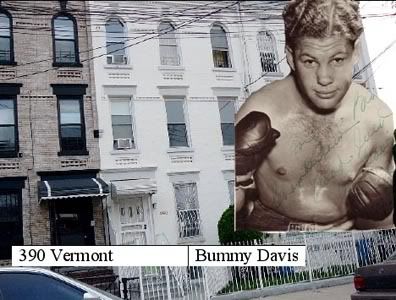
Above, Al's home circa 1930. Below a section from one of my google maps showing the residences of neighboring notables all around the same time as Bummy. The Shapiro brothers were associates of Murder Inc.
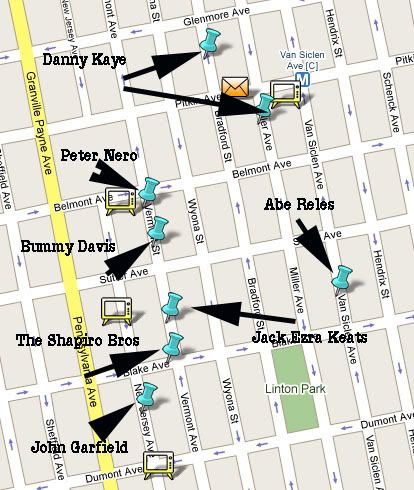
Al "Bummy" Davis
As long as we are on the boxing thread here's a slide show from July of 2007 that I never posted. A fascinating story about the boxer Al "Bummy" Davis called Bummy Davis vs. Murder Inc. by Ron Ross Davis' real name was Davidoff and he lived in Brownsville amongst the likes of the Murder Inc crew of Lepke, Reles, Strauss, and Goldstein. I'm sure some of the KV fathers who grew up nearby like Moe Nathanson and Jack Karney knew about these bad boys and knew enough to avoid them.
A review:
Ron Ross' dazzlingly descriptive biographical novel does a wonderful job in the recreation of the Brooklyn Jewish ghetto of Brownsville during the throes of the Great Depression. Ross exhaustively researched his material to give us a feel for the sights, sounds, smells of the crowded, sometimes squalid tenement that Brownsville was, complete with Yiddish expressions and verbiage common for the time.
Brownsville spawned both Murder Inc., the Jewish Mafia, and Albert Abraham Davidoff, better known as Bummy Davis, a dynamic lightweight boxing contender with a thunderous left hook. Murder Inc. was headed by Louis "Lepke" Buchalter. He used local Jewish thugs such Abe "Kid Twist" Reles, "Pittsburgh Phil" Strauss and "Buggsy" Goldstein to enforce policies
of protection, loan sharking, extortion, prostitution, and bootlegging. They terrorized the community using murder to keep everyone in line.
Davis, whose dad was a local merchant, had an older brother Willie who was a Lepke henchman. Davis who was a loyal, thoughtful, industrious and respectful guy, could never shake a negative image brought about by the exploits of his brother. After working as a fruit peddlar from a pushcart at the tender age of 10, he soon discovered that his fighting skills learned on the streets could be honed into productive boxing skills.
He turned professional at 16 lying about his age and became a money making prize fighter with exceptional skills. He used his money to buy his parents a home and refused to be controlled by the mobsters in cohoots with Murder Inc.
The story goes on to chronicle both the rise anf fall of the Brownsville Jewish mafia. Unfortunately the storied life of Bummy Davis was also abbreviated. At the tender age of 25 having retired from boxing due to the rampant corruption and prejudices that existed and about to begin a new career, he was gunned down in a bar room stick up trying to protect his friends.
Sid Terris: 1930
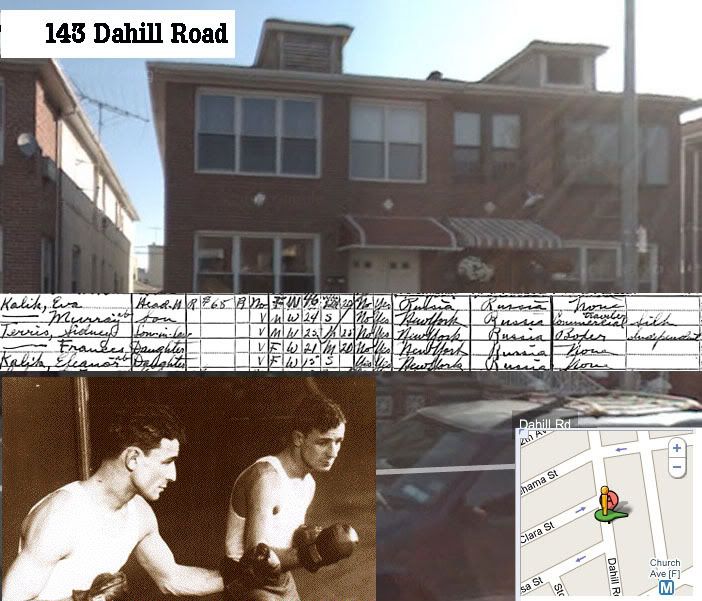
I discovered that in the 1930 census 25 year old Sid is living in Brooklyn with his wife Frances, nee Kalik. The address is 143 Dahill Road. The current house may be some incarnation of the original because it is noted as being constructed in 1910. His occupation is listed as an "independent" boxer. 143 Dahill is right near PS 230 and Green-Wood Cemetery and less than a mile from where I live.
Sid Terris: 1922
Jewish Boxers
Searching for nyc bakery images landed me fortuitously on artist Charles Miller's site with great illustrations of Jewish boxers. I used thumbs of those images with part of the soundtrack of Cinderella Man As previously mentioned there were many Knickerbocker fathers who boxed in the 20's and 30's. Some might have rubbed elbows (and chins) with some of those displayed here. The great Benny Leonard lived on 9th Street and Miller's site has a bio of another LES fighter named Sid Terris. An excerpt:
Sid Terris, "The Galloping Ghost, "Lightweight Contender
By Evan Lerner
Boxing writers of the era, having rarely seen a fighter faster on his feet or with quicker hand speed, fondly referred to him as "The Dancing Master of the East Side". The Bible of Boxing, Ring Magazine called him, "the speediest fighter of his generation". And when Damon Runyon called Sid Terris, "The Galloping Ghost of the Ghetto", the name stuck.
Sidney Terris was born one of five children of Fred and Gussie Terris on September 27th 1904 on Clinton Street in the Lower East Side of Manhattan. In the 1910πs and 20s the Lower East Side was veritable breeding ground for prizefighters. Hundreds of fighters, some of the best of a generation came from this impoverished neighborhood of Jewish immigrants.
Fred Terris passed away suddenly when Sid was eight years old, leaving Gussie to care for the entire family herself. Encouraged by her to focus on his studies and desperate to help support the struggling family, Sid decided he would grow up to become a lawyer. But he was a natural athlete; fast, agile and rangy and instead of focusing on his studies, everyday after school he and his friends would make their way to one of the local gyms to shoot some hoops.
One afternoon at Rutger's gym, the neighborhood boxing instructor, Dan Caplin noticed thirteen year-old Sid's footwork. Caplin, a bespectacled schoolteacher by trade, signaled over to his brother and fellow trainer, Hymie. Dan and Hymie Caplin were streetwise, low level trainer/managers in the New York City fight game, where if you had a hot prospect, there was profit. Dan was sure he had found unmined gold in young Sid Terris, and Hymie, blond and pink-cheeked took one look at the kid's footwork and agreed. That day Dan Caplin convinced Sid to take boxing lessons at the gym.
Much like his Hebrew Schoolmate, Ruby Goldstein, Sid was an instinctive, scientific boxer and he had an unparalleled speed and agility. He took to the "sweet science" as quickly and easily as his feet moved him around the ring. He was short on punching power, but he moved like Mercury; Hymie Caplin figured his lightning feet would propel him to the lightweight championship if he couldn't get there with his fists alone.
To test train their new protege, the Caplin's began entering Sid in amateur tournaments. He coasted through the ranks winning the Metropolitan, New York State, National, and International amateur titles. The Caplin brothers turned Sid pro in 1922 and by then he had chalked up 50 consecutive amateur wins. After 20 fights in his first year as a pro, Sid lost only twice. The fleet-footed kid, now a handsome, tall 19-year-old, was suddenly a prominent lightweight contender.
1924 was a star-making year. He delivered eighteen straight wins, the most notable in August when he fought Benny Valgar. In his fights around New York City, the Ghetto Ghost was drawing huge crowds.
In October of that year, the bible of boxing, Ring Magazine wrote, "There is no stopping Terris in his quest of the 135-pound laurels. Many are of the opinion that in six or eight more months he will defeat [Benny] Leonard".
That was quite a statement to make. Benny Leonard had been the undefeated lightweight king since 1917. His fists and feet were the picture of speed, but what made him most dangerous was his punch: it was nothing if not persuasive. Leonard with his smooth, slicked back dark hair was fond of declaring that it was a rare event it ever got mussed in a fight. To this day he is considered one of the top five lightweights of all time. For Sid to unseat the man they called The Ghetto Wizard, he would need to out class the master.
Since the article mentions that Terris lived on Clinton and fought at the Rutger's gym
more than likely Terris lived on the southern part of Clinton which would be Ward 7. Rutgers only extended from South Street to East Broadway. It would be interesting to figure out the exact address of the gym.
Mort Zachter's Dough
An observation of the Italian/Jewish memoir presentation at the Tenement Museum: It echoed a KV memoir juxtaposition from the two most dominant groups of the KV baby boom era. That occasionally takes place on these "pages." Carl and Mort's conviviality at the event was certainly a model what should have taken place at all times in a previous era. Above, I combined the audio from Mort's NPR interview with Kate Davidson back in September of 2007 an excerpt:
For anyone who lives paycheck to paycheck, Mort Zachter's story might seem like dream come true: In 1994, a banker called Zachter's home and asked him if he'd like to take control of his Uncle Harry's million-dollar money-market account. It turned out that two of his uncles had quietly amassed about $6 million, scattered in separate accounts.
Zachter's windfall let him pursue his dream of writing. His new book Dough: A Memoir, is the culmination of that dream. It's also a story of daily life at the family's bakery from the 1940s through the '60s and a snapshot of immigrant life in New York.
After his windfall, Zachter delved into his family's secrets. He never found out why his uncle sat on his wealth rather than helping the family, but he realized that his uncles — like other children of immigrants who had survived the Depression — had a complicated relationship with money. His uncles Harry and Joe drafted most of the family to work at bakery, which sold bread they bought wholesale from other city bakeries. Zachter's mother — his uncles' sister — gave up her dream of teaching to work at the bakery.
The images in the slideshow were an assortment of scenes from nyc bakeries. The first image is of Mort with the current owners of the Ninth Street Bakery, Oleg and Tetyana Kucherenko. There's also a batch from the "flagship" Jewish bakery of the LES and the KV neighborhood, Gertel's. Truth be told the Italian bakeries, Savoia's especially, were much better.
Carl Capotoro's Twisted Head
Carl Capotoro and Mort Zacher spoke at the Tenement Museum yesterday as part of their wonderful Tenement Talks program
Both read from their new books. Carl's is Twisted Head
The video above combines his youtube clip about the book along with clips from his more recognizable claim to fame as Little Paulie Germani on the Sopranos He's the man who passed along the famous joke about Ginny Sack and later fell victim to Chris' coke fueled paranoia. He survived and his Uncle (Big) Paulie took revenge.
Little Paulie Germani: Ralph told this funny f....n' joke though at umm..at Albert's party. He goes, "Ginny Sack had a ninety five pound mole surgically taken off her ass."
Paulie Walnuts: He said that?
Little Paulie Germani: Yeah...
Paulie Walnuts: And you think its funny?
Little Paulie Germani: Uh...it's some bad taste...huh?
Some of the excellent reviews of Twisted Head:
Entertainment Weekly
Carl Capotorto's family name translates as ''twisted head,'' which, he writes, ''is no accident.'' The gay actor/writer grew up in an eccentric Italian-American family headed by a father so rigid, he spent much of his time throwing customers out of the family pizza joint in the Bronx for breaking his ridiculous rules (''NO SHARING, NO EXTRA CHEESE, NO SLICES AT THE TABLE!'' etc.). His tyranny didn't end there, either — he also heaped verbal assaults upon his wife and kids (and anyone else who happened to be around). But despite his semi-tragic upbringing, Capotorto has managed to writeTwisted Head, a delightfully zany memoir — see, for example, his account of his father's virulent anti-pornography crusade.
—Kate Ward
“Carl Capotorto’s first book was for me a wonderful reading experience. In part because my own upbringing was strikingly similar to Carl’s. On the other hand, you don’t have to be Italian to be moved by this powerfully touching memoir.”
—Mario Cuomo
“Like an Italian grandmother that hugs you fiercely to her bosom, Carl's memoir of his upbringing in the Bronx doesn't let go until you realize the melancholy one finds in joy and the joy one finds in melancholy. A splendid and insightful read, as funny as it is sad.”
—Lewis Black
“Twisted Head is a memorable portrait of a sweet and awkward boy growing up on the sometimes mean streets of the Bronx, struggling with his imposing father, brutal peers, inattentive teachers, his own sexual identity. Not since Mario Puzo’s novel The Fortunate Pilgrim, have readers been treated to such a sweet and sour tale of growing up Italian-American and of coming to appreciate the sturdy rock that is family.”
—Ken Auletta
“When I got Twisted Head, I meant to read ‘at it,’ like so many things. I really meant to put it down. I couldn’t. It’s one of the most hilarious descriptions of growing up Italian I have ever read. And then, to use that story to tell a far more serious story about growing up gay, moves the book way past the laughs.”
—Nick Pileggi, author of Wiseguy
Tuesday, January 27, 2009
1915 On Orchard Street
Life On Mars On Orchard Street
Monday, January 26, 2009
Tragedy On East Broadway: 1/23/09
from the nytimes of 1/23an excerpt
Van Plows Into Line of Children in Chinatown, Killing 2
By CHRISTINE HAUSER: An unoccupied van that had been left in reverse mounted a sidewalk and rammed into a group of preschool students on a busy street in Chinatown on Thursday, killing two of the children and injuring at least 11 other people, the authorities said.
The crash, on East Broadway between Catherine and Market Streets, transformed the teeming strip of produce stands, restaurants, tenements and shoppers into a scene of chaos as schoolchildren lay bleeding on the sidewalk and witnesses shrieked.“I heard screaming,” said Katharine Montaldo, 39, from the East Village. “I came running up. All I saw was blood.” The children had been walking back to their preschool, just around the corner, after a trip to the library. They were linked in a daisy chain intended to keep them together when the van lurched onto the sidewalk and crashed into them. The police said that a 4-year-old girl, Hayley Ng of Chinatown, died at the scene and that Diego Martinez, a 3-year-old boy from Chelsea, died at New York Downtown Hospital. Another 4-year-old girl was seriously injured and taken to the hospital, where she was listed in critical condition late Thursday; her name was not released. About 10 other people, children and some adults, had minor injuries, the authorities said.The driver of the van, identified as Chao Fu, 52, of Brooklyn, was not charged; his license and registration papers were in order and he tested negative for alcohol, said Paul J. Browne, the police spokesman. Mr. Chao had double-parked and entered a store, leaving the van running and in reverse gear, thinking it was in park, Mr. Browne said.
A New Look For The Old Five Points Mission
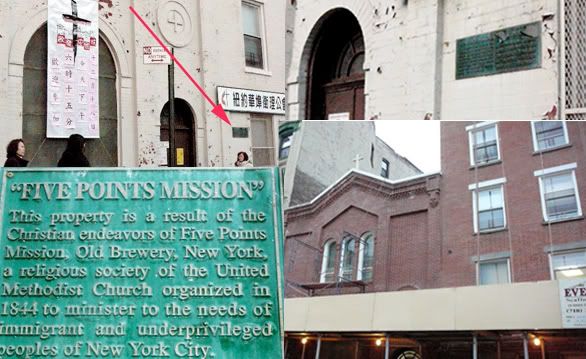
The old mission was resurfaced with red brick (lower right section of pic). Will the (green) plaque be re-installed? A previous post on the mission
Bellel Seeks Out Bells 2

Sometimes the original isn't better, despite the lure of nostalgia. A trip to Monroe Street for a super Sol-Moe value haircut, also incorporated seeking some chocolate bells on Grand Street. They were sold out. Instead I got some sub-par and overpriced checkerboard cake and cookies. Compare that to the great bells Murray imported recently from Mt. Laurel, New Jersey. To round out the picture some Kossar's bialys, now 90 cents!
Life On Mars
I read the nytimes article on this show yesterday. I haven't watched much "regular" tv in a while other than sports. This looks like it might be worth a shot. Many of the scenes look like they were filmed on the LES. The season premiere's opening was shot in the Smith Houses.
An excerpt from the article:
LIKE any worthwhile journey through New York, the television drama “Life on Mars” takes a roundabout route to arrive at a familiar destination. In its first episode, a New York police detective named Sam Tyler is hit by a car. When Tyler, played by the actor Jason O’Mara, recovers from the accident, he finds he has woken up in the year 1973.
He is still an N.Y.P.D. detective, but much else has changed. John Lindsay is the mayor, the Knicks are a team with championship potential, and, perhaps most remarkable, the revitalized metropolis he thought he knew has returned to its dingier, more dangerous ways.
Within the context of “Life on Mars,” which had its premiere on ABC in October and returns to the air on Wednesday night after being on hiatus for nearly two months, it’s up to the viewer to decide whether Tyler has actually traveled back in time or if this ghost of Gotham past exists only in his injured mind. Yet there is no mistaking the presence of the real-life New York throughout the show, one in which, with the help of the occasional bit of digital trickery, the modern city is deftly used as a stand-in for its earlier, more desperate self.
Sunday, January 25, 2009
A Sit Down To Work Out The Details On The Next Reunion
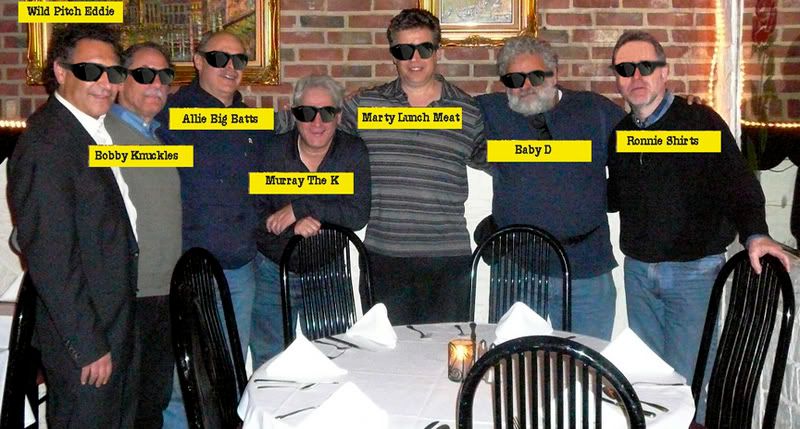
According to instructions left by the Godfather, some the underbosses were assigned to work out the final details on the next reunion. A picture above taken at an undisclosed Brooklyn restaurant last week. Wild Pitch Eddie came by mistake. He thought Rachel was going to be there.
KV Chatter: Jose Torres, Tanahey And Pete's Heroes
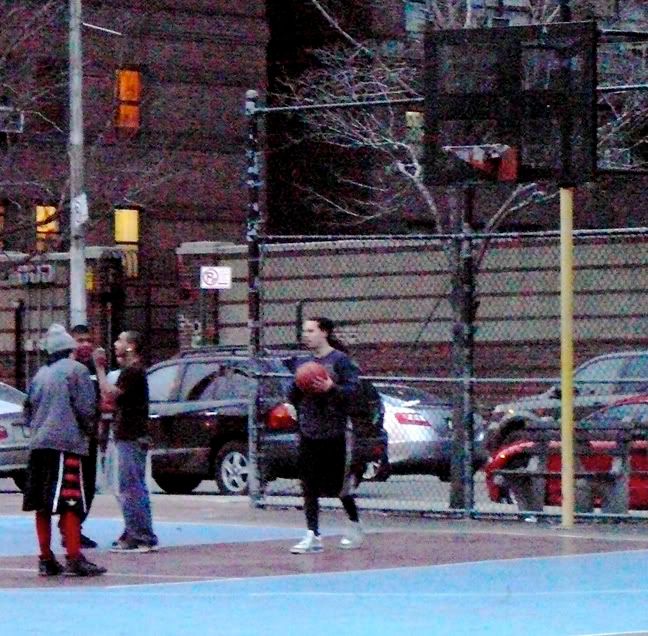
Did everybody catch that Jose went into Pete the Hero King to get his sandwich? That was another thing about that place that made it magical, working men were in and out of there all the time. It made a little pischa feel like a man to pick out the bread and tear out the dough and order up.
Always liked that place despite the flies stuck between the sign and the window.
THE FLIES BETWEEN A COUPLE OF SLICES OF BREAD, BACON, LETTUCE AND TOMATOES, WITH MAYO MAYBE COST A BUCK. TWO BUCKS WITHOUT THE FLIES.
Over the past many years, and fairly recently, I would get into the elevator in my apartment ( with Jose Torres.I think either his daughter or girlfriend lives in my building. We would always politely say 'hi' to each other, as familiar faces...I certainly recognized him as the great former boxer. My observation of him each time, was that this man still had a body that looked like it was made of stone, with the structure of his face looking like something that was sculpted from granite. I had a sense of his age from remembering that his glory days in the ring were in the 60s...but he looked great, as recently as a few months back, the last time I bumped into him...like he could still go a few rounds. A quiet, nice man!
THE SAME COULD BE SAID OF QUITE A FEW KNICKERBOCKER WISEGUYS. NICE QUIET MEN. UNFORTUNATELY, MY PERSONAL EXPERIENCES WITH TORRES WHEN HE WAS CHAIRMAN OF THE NY STATE AC WAS THAT HE WAS AN INTEGRAL PART OF THE CESSPOOL THAT WAS AND WILL ALWAYS BE THE BUSINESS SIDE OF BOXING. WE GO THROUGH ERA AFTER ERA IN BOXING WHERE SOME PEOPLE FROM FRANKIE CARBO TO DON KING ROB THE FIGHTERS BLIND, WHILE ENHANCING THEIR OWN BANK ACCOUNTS. JOSE TORRE WAS IN A POSITION TO DO GOOD FOR BOXING AND THE FIGHTERS. INSTEAD HE JOINED THE SEAMY SIDE. IN FOR A DIME, IN FOR A DOLLAR. WHAT MADE IT EVEN WORSE IS THAT HE HAD BEEN A FIGHTER HIMSELF AND YOU'D THINK HE WOULD HAVE BEEN MORE SENSITIVE TO THE POOR BOXER'S PLIGHT. BUT AS WITH ANYTHING ELSE MONEY TALKS AND BULLSPIT WALKS. I KNOW HE'S DEAD AND SOME PEOPLE FIND IT ANATHEMA TO SPEAK BAD OF THE DEAD. I HAVE NO COMPUNCTIONS WHEN IT COMES TO PEOPLE LIKE JOSE TORRES. I BET I KNOW WHO THAT YOUNG WISEGUY WITH THE GUN WAS. UNFORTUNATELY, MY LIPS ARE SEALED. YOU COULD CALL IT SELF PRESERVATION. EVEN FROM THE GRAVE THESE GUYS HAVE LONG ARMS AND FAST HANDS.
Elevator experiences has been one of my retirement ideas for a book which any of you are welcome to, since it appears now I'll never retire. I was in an elevator with Bill Cosby and the guy who was in the tv show Mod Squad. Our son once rode the elevator with Scarlett Johansson and my Mom was in an elevator at Macy's, obviously a number of years ago, with Eleanor Roosevelt.
All marvelous experiences, I'm sure. I'd gladly volunteer to trade places with your son.
Scarlett Johansson, ok let's point to her when Jews get a bad rap for Bernie Madoff.
WHEN I WORKED FOR BERT SUGAR AT RING MAGAZINE, I WAS STUCK IN HIS ELEVATOR IN AN OLD BUILDING ON 31 ST BETWEEN 6 TH AND 7 TH AV. I HAD JUST DROPPED OFF MY COPY, WHEN THE ELEVATOR STOPPED BETWEEN FLOORS. I WAS IN THE TINY ELEVATOR (THINK KV BUT SMALLER) WITH FOUR WOMEN. ONE OF WHOM WAS CLAUSTROPHOBIC. IT WAS RIGHT ABOUT 5 PM, QUITTING TIME. THE ONE WOMAN STARTED FREAKING OUT. SHE WAS SCREAMING ON THE FLOOR ROLLED UP INTO A BALL LIKE A FETUS. NICE, REAL NICE. I STARTED SCREAMING FOR ANYONE TO HELP US OUT. I HEARD BERT UPSTAIRS SAYING HE WOULD CALL THE OWNERS OF THE BUILDING.
ABOUT AN HOUR LATER (IT SEEMED LIKE ABOUT A WEEK), THE DOOR IN THE CEILING OF THE ELEVATOR OPENED AND TWO HASIDIC JEWS DROPPED DOWN TO RESCUE US. I WAS NEVER SO HAPPY TO SEE ANYONE IN MY LIFE. I IMMEDIATELY RAN TO THE NEAREST BAR TO SETTLE MY NERVES. BERT MET ME AND TRUE TO FORM, I STILL PAID. THE NEXT TIME BERT SUGAR BUYS A DRINK WILL BE THE FIRST TIME.
I'll start taking the stairs, instead of the elevator.
Is Bert Sugar still smoking the same cigar?
FUNNY THING I KNOW BERT MORE THAN 30 YEARS AND I NEVER ACTUALLY HAVE SEEN HIM SMOKE THE DAMN CIGAR. IT'S ALWAYS UNLIT, STUCK IN THE CORNER OF THIS MOUTH. THE CHEAP B------ DOESN'T WANT TO SMOKE IT, BECAUSE THEN HE HAS TO BUY ANOTHER. AND THE CIGARS HE HAS ARE THE CHEAPEST ON THE MARKET. BURNT ROPE TASTES BETTER. LIKE WHITE OWLS, OR SOMETHING WORSE.DEAD OWLS.
Jose Torres In Tanahey Park And Pete's Heroes

The Godfather told me about an article by Phil Mushnick about Jose Torres in the nypost that mentioned Pete's Heroes and Tanahey. (The Godfather is still under the impression that the post is a real newspaper)
Here's a link to the full article:
The choice part:
On the way into the cafeteria, I ran into Torres, who was on his way out. He'd made for me a glorious, career-sustaining day.
The other: During lunch or after work we'd play basketball in the playground behind The Post. Sometimes Torres would play. You could tell he didn't grow up playing basketball. But his hands were so fast and strong, his aim so accurate, that on defense, when he swatted at the ball he almost always hit it, and flush, knocking it away.
Dom Marrano and Peter Tocco, citysiders - 35 years later, we remain friends - one day took a break from the game to walk around the corner to buy a soda at Pete the Hero King's. They returned with this:
They'd just run into a young neighborhood wise guy who asked, "Is that Jose Torres?" motioning toward the basketball court. "Yeah," they replied.
"Can he play?"
"Not really," said Marrano, "but he's got very fast hands."
"Yeah?" said the wise guy, lifting his shirt to reveal a pistol in his waistband. "Is he faster than this?"
Remember it like it was yesterday. phil.mushnick@nypost.com
coming soon, plenty of KV chatter on Jose Torres
A Visit To The KV Godfather
Thursday, January 22, 2009
JFK's Inauguration Ball From Life Magazine
Two "who's almost who in KV" people were there-Tony Curtis and Gene Barry
Inaugural Ball
Inaugural Ball
Wednesday, January 21, 2009
This Land Is Your Land
The highlight of the pre-inaugural concert at the Lincoln Monument. The former blacklisted Pete joins Springsteen.
From the nycpublicschoolparents' blog
A moment to take pause and appreciate the history we are living through.
Here is the video from Sunday’s inaugural concert with Pete Seeger and Bruce Springsteen, performing the song that, in my opinion, should be our national anthem – “This Land is Your Land”.
The song was written by Woody Guthrie in 1940, towards the end of the Great Depression. The version on this occasion contained all its verses, including those rarely sung. They are below.
"In the squares of the city - By the shadow of the steeple
By the relief office - I saw my people
As they stood there hungry, I stood there wonderin
If this land's still made for you and me."
"There was a big high wall there - that tried to stop me;
Sign was painted - it said private property;
But on the other side - it didn't say nothing;
That side was made for you and me."
"Nobody living can ever stop me,
As I go walking - that freedom highway;
Nobody living can ever make me turn back
This land was made for you and me."
Pete has a history on the lower east side. After he left Harvard in 1940 he and his brother moved to 118 E. 11th Street. From a Seeger biography, How Can I Keep from Singing?
Seeger shopped the ethnic stores and bakeries, sampling piroshki, bagels, and sour cream for the first time. He peered in Ukranian churches and Irish bars. With so much to explore, he thought he'd never tire of the city. His imagination hopped from one project to the next.
What Do The Simple Folk Do
I've been hibernating and it's too bad that this is my first official post of 2009,-a downer, but a flurry of kv email chatter awakened me. It goes like this: Unfortunately, the desire to reconnect with your childhood friends, like many of us do who find Knickerbocker Village, does not always spring from a fountain of warmth and nostalgia, but can come from a bitter desire to put those "friends" down. Sort of like "if the riff raff could see me now, wrapped in all of my material achievements. I, unlike you, am not a simpleton." An embarrassment to the KV community, or any community, has fully revealed herself. Hopefully she's gone for good.
This song sort of reminds me of that theme, though, as portrayed in Camelot, its overall spirit is much kinder and gentler. For the KV baby boomers who experienced the excitement of the Kennedy Camelot, there is a wish for an Obama Camelot. I'll continue to try to whistle.
GUENEVERE
What do the simple folk do
To help them escape when they're blue?
The shepherd who is ailing, the milkmaid who is glum
The cobbler who is wailing from nailing his thumb
When they're beset and besieged
The folk not noblessly obliged
However do they manage to shed their weary lot?
Oh, what do simple folk do we do not?
ARTHUR
I have been informed by those who know them well
They find relief in quite a clever way
When they're sorely pressed, they whistle for a spell
And whistling seems to brighten up their day
And that's what simple folk do
So they say
GUENEVERE
They whistle?
ARTHUR
So they say
(they whistle for a while)
GUENEVERE
What else do the simple folk do
To pluck up the heart and get through?
The wee folk and the grown folk
Who wander to and fro
Have ways known to their own folk
We throne folk don't know
When all the doldrums begin
What keeps each of them in his skin?
What ancient native custom provides the needed glow?
Oh, what do simple folk do?
Do you know?
ARTHUR
Once, upon the road, I came upon a lad
Singing in a voice three times his size
When I asked him why, he told me he was sad
And singing always made his spirits rise
And that's what simple folk do
I surmise
GUENEVERE
They sing?
ARTHUR
I surmise
BOTH
Arise, my love, arise, my love
Apollo's lighting the skies, my love
The meadows shine with columbine
And daffodils blossom away
Hear Venus call to one and all
And taste delight while you may
The world is bright and all is right
And life is merry and gay
GUENEVERE
What else do the simple folk do?
They must have a system or two
They obviously outshine us at turning tears to mirth
And tricks a royal highness is minus from birth
What, then, I wonder, do they
To chase all the goblins away?
They have some tribal sorcery you haven't mentioned yet
Oh, what do simple folk do to forget?
ARTHUR
Often, I am told, they dance a fiery dance
And whirl 'till they're completely uncontrolled
Soon the mind is blank and oh, they\'re in a trance
A violent trance astounding to behold
And that's what simple folk do
So I'm told
GUENEVERE
They dance?
ARTHUR
So I'm told
(they dance)
GUENEVERE
What else do the simple folk do
To help them escape when they're blue?
ARTHUR
They sit around and wonder what royal folk would do
And that's what simple folk do
GUENEVERE
(spoken)
Oh, no, really?
ARTHUR
I have it on the best authority.
BOTH
(sung)
Yes, that's what simple folk do


